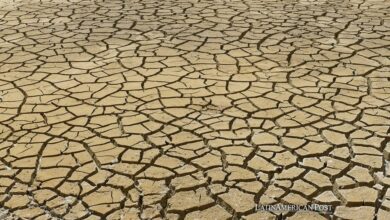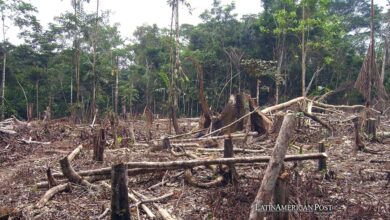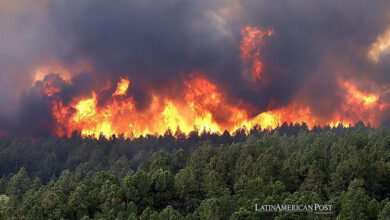Meet the Winners of the Goldman 2023 Prize, the Environmental “Nobel”
The Goldman Environmental Prize, known as the environmental "Nobel," is awarded yearly to environmental advocates worldwide. We tell you about the winners, and we highlight the Latina Alessandra Korap Munduruku.

Photo: goldmanprize.org
LatinAmerican Post | María Fernanda Ramírez Ramos
Escucha este artículo
Leer en español: Conoce a los y las ganadoras del premio Goldman 2023, el “nobel” ambiental
On April 24, the 2023 Goldman Awards were awarded to 6 environmental defenders. It is the most outstanding recognition of the leaders who positively impact the planet. To date, 219 people from 95 countries have been awarded. Among them, Latinas such as Francia Márquez, Nemonte Nenquimo, Berta Cáceres, or Máxima Acuña stand out. We tell you the story of this year's winners!
Alessandra Korap Munduruku – Brazil
This 38-year-old leader, a member of the Munduruku indigenous community of Sawré Muybu, is one of the most prominent defenders of the Amazon. She is president of the Pariri Indigenous Association, which supports communities in the Tapajós River region in Brazil.
The 2023 Goldman Prize was given to him because he: "organized community efforts to halt British mining company Anglo American's mining development in the Brazilian Amazon rainforest. In May 2021, the company formally committed to withdrawing 27 approved research applications for mining within indigenous territories, including the Sawré Muybu Indigenous Territory, which contains more than 400,000 acres of tropical rainforest," according to the organization. She also advocated for the voices of women and children to be heard in the communities.
Although his fight was not easy, he brought together various communities and organizations to protect the Amazon as a source of life against mining and its exploitation in general. He organized a fundraising campaign and used social media to spread his message and increase the pressure on Anglo Americans. Finally, after years of work, in 2021, Anglo-American formally announced its commitment to withdraw 27 mineral research permits approved in indigenous territories in the Amazon.
"The Anglo-American may be powerful for you, but for me, the powerful are the river, the strength of our territory and our people, the ant doing its work, and the resistance of our people for more than 500 years in the fight for our land "Alessandra responded to an interview with the BBC. These words are proof of the courage with which this woman has led the fight to stop mining in the Amazon jungle.
"The Mundurukú People demand the demarcation of their lands to defend the Amazon and against mining. Despite the victory, their collective fight continues. The resistance of the Munduruku against the British mining company Anglo-American led to the halt of mining operations in their territories in 2021. Still, the threats continue," notes Amazon Watch.This organization invites citizens to support the petition of indigenous peoples for the Brazilian government to declare their ancestral lands as protected Indigenous Territories.
Zafer Kizilkaya – Türkiye
This environmental advocate led in expanding the MPA marine network of protected areas in Turkey. With the support of fishing cooperatives and the Turkish authorities, 310 miles of the Mediterranean coast were covered. The protected regions "include an expansion of the MPA network by 135 square miles (350 square kilometers) without trawling or purse seine fishing and an additional 27 square miles (70 square kilometers) of no-take zones," the Prize organization notes. Goldman.
Chilekwa Mumba – Zambia
This African has become a benchmark for climate justice for his region. Chilekwa Mumba organized a lawsuit to hold the mining company Vedanta Resources responsible for the contamination of the Copperbelt province due to copper mining. "Chilekwa's victory in the UK Supreme Court set a legal precedent: it was the first time that an English court ruled that a British company could be held liable for environmental damage caused by the operations of a subsidiary in another country," he notes. The organization of the Goldman Prize. This precedent served to hold other companies accountable. This is the case of Shell Global in Nigeria.
Also, who runs an orphanage with his wife, he learned of previous community processes that had tried to sue companies for water contamination. From 2015 to 2021, Chilekwa was a facilitator between the Chingola communities (with more than 2,000 people united for the case) and the Leigh Day lawyers.
Tero Mustonen – Finland
Since 2018, he has led the transformation of 62 former industrial sites into biodiverse wetlands and productive habitats. He has partnered with the SnowChange organization, which works with indigenous communities in Finland and the northern and Arctic regions to preserve ecosystems. It contributed to the restoration of nearly 35,000 hectares, enhancing their capacity to be effective carbon sinks, as they are peat bogs and wetlands. Approximately 30% of Finland comprises peat bogs, although commercial activities have dried them up.
Delima Silalahi – Indonesia
Delima led a campaign to hand over legal management of more than 7,000 hectares of tropical forests to six indigenous communities in North Sumatra. Consequently, the communities have recovered their territories, which had been used by a paper production plant with non-native eucalyptus monocultures, and restored the ecosystem. In this way, the capacity of these forests to be carbon sinks and protect native biodiversity is also being recovered. In addition, they became an example of the indigenous struggle against land grabbing.
Diane Wilson – United States
For this reason, he dedicated his efforts to fighting against polluting companies. In December 2019, Diane Wilson won a landmark case against Formosa Plastics, one of the world's largest petrochemical companies. The 74-year-old woman is a Texas shrimper who began activism in 1989 when she learned that her county, Calhoun, was the most toxic in the United States. She sued them for illegally dumping toxic plastic waste on the Texas Gulf Coast. "The $50 million settlement is the largest award in a civil lawsuit against an industrial polluter in the history of the US Clean Water Act," according to the Goldman Prize information. As part of the agreement, this company had to commit to achieving "zero discharge" of plastic waste at its factory and pay fines as long as it continues.




